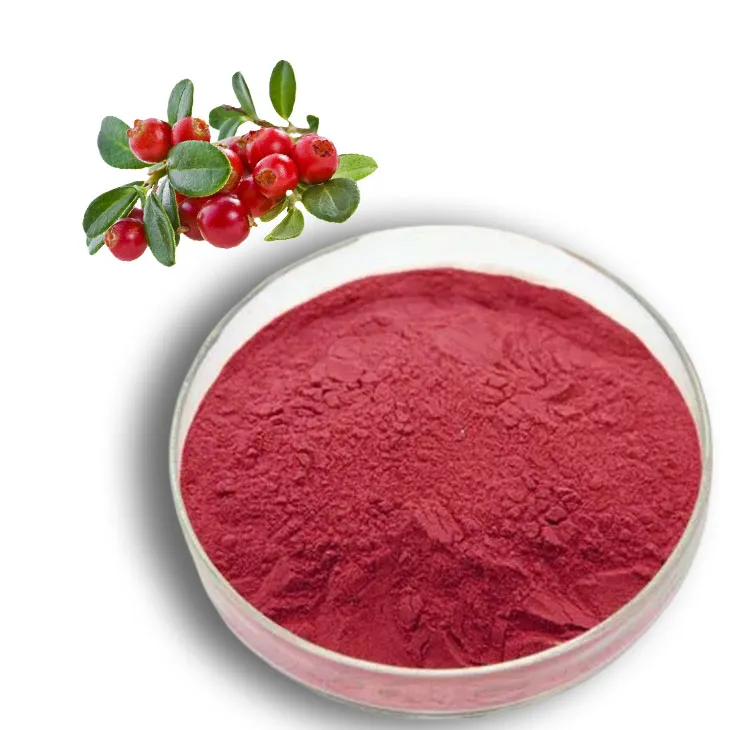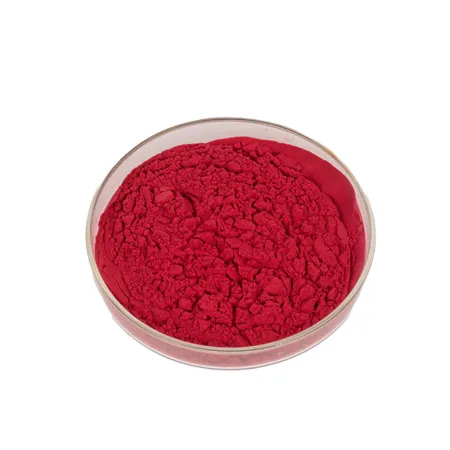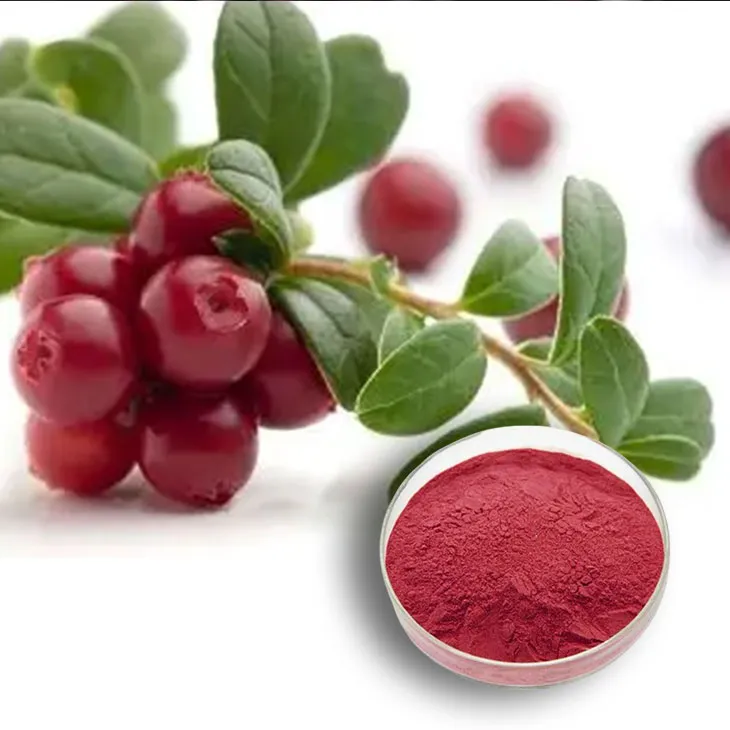- 0086-571-85302990
- sales@greenskybio.com
Powerful Cranberry Extract: Its Role in Athletic Performance
2024-11-11

1. Introduction
In the world of sports and athletic performance, athletes are constantly seeking natural ways to enhance their capabilities. One such natural substance that has been garnering attention is Cranberry Extract. Cranberries, known for their tart taste and numerous health benefits, are now being explored for their potential role in improving athletic performance. This extract contains a variety of elements that could have a profound impact on an athlete's physical abilities.

2. Nutritional Components of Cranberry Extract
Cranberry Extract is rich in several key nutrients that may contribute to its positive effects on athletic performance.
2.1 Vitamins
Cranberries contain vitamins such as vitamin C. Vitamin C is an antioxidant that plays a crucial role in the body. It helps in the synthesis of collagen, which is important for connective tissues in the body, including those in muscles and joints. This can be beneficial for athletes as it can support the integrity of muscle and joint structures, reducing the risk of injury during exercise.
2.2 Minerals
There are also minerals present in cranberry extract. For example, manganese is one of the minerals found in cranberries. Manganese is involved in various enzymatic reactions in the body. In the context of athletic performance, it is important for carbohydrate metabolism and bone health. Adequate manganese levels can help ensure that the body efficiently utilizes carbohydrates for energy during exercise, which is essential for endurance athletes.
2.3 Phytochemicals
Cranberries are renowned for their high content of phytochemicals. One of the most well - known phytochemicals in cranberries is proanthocyanidins. Proanthocyanidins are a type of flavonoid that has antioxidant properties. These antioxidants can help protect the body's cells from damage caused by free radicals. During exercise, the body generates free radicals due to increased oxygen consumption, and the antioxidant action of proanthocyanidins can counteract this oxidative stress, potentially reducing muscle fatigue and promoting faster recovery.

3. Effects on Energy Levels
The nutrients in cranberry extract can potentially influence an athlete's energy levels in several ways.
3.1 Carbohydrate Metabolism
As mentioned earlier, minerals like manganese play a role in carbohydrate metabolism. By facilitating the breakdown and utilization of carbohydrates, cranberry extract can ensure a steady supply of energy during exercise. Carbohydrates are the primary source of energy for high - intensity exercise, and any improvement in their metabolism can enhance an athlete's performance. For example, in a sprinting event, where quick bursts of energy are required, efficient carbohydrate metabolism can mean the difference between a good and a great performance.
3.2 Mitochondrial Function
The antioxidants in cranberry extract, such as vitamin C and proanthocyanidins, may also support mitochondrial function. Mitochondria are often referred to as the "powerhouses" of the cell as they are responsible for producing adenosine triphosphate (ATP), the body's main energy currency. By protecting the mitochondria from oxidative damage, cranberry extract can help maintain efficient energy production. This is especially important for endurance athletes, such as marathon runners, who rely on continuous energy production over a long period of time.

4. Role in Muscle Repair
After intense exercise, muscle repair is crucial for an athlete to recover and improve their performance over time.
4.1 Protein Synthesis
Cranberry extract may influence protein synthesis, which is essential for muscle repair. The nutrients in the extract can support the body's anabolic processes. For instance, the vitamins and minerals can act as co - factors in enzymatic reactions involved in protein synthesis. By promoting protein synthesis, cranberry extract can help repair damaged muscle fibers more quickly, allowing athletes to get back to training sooner and with less downtime.
4.2 Anti - Inflammatory Effects
The anti - inflammatory properties of cranberry extract can also contribute to muscle repair. Exercise can cause inflammation in the muscles, especially after strenuous or repetitive workouts. The phytochemicals in cranberry extract, such as proanthocyanidins, have been shown to have anti - inflammatory effects. By reducing inflammation, the extract can create a more favorable environment for muscle repair and growth.

5. Protection Against Oxidative Stress
Oxidative stress is a major concern for athletes, and cranberry extract offers several ways to combat it.
5.1 Antioxidant Capacity
The antioxidants present in cranberry extract, including vitamin C and proanthocyanidins, scavenge free radicals. Free radicals are unstable molecules that can damage cells, proteins, and DNA. During exercise, the production of free radicals increases due to factors such as increased oxygen consumption and muscle contractions. By neutralizing these free radicals, cranberry extract helps protect the body's cells from oxidative damage. This protection is not only important for muscle cells but also for other tissues in the body, such as the heart and lungs, which are also under stress during exercise.
5.2 Reducing Muscle Fatigue
Oxidative stress can lead to muscle fatigue. By protecting against oxidative stress, cranberry extract can potentially reduce muscle fatigue. When muscles are less fatigued, athletes can perform better and for longer periods of time. For example, in a long - distance cycling race, reducing muscle fatigue can give an athlete an edge over their competitors.
6. Considerations and Future Research
While cranberry extract shows great promise in enhancing athletic performance, there are some considerations to keep in mind.
6.1 Dosage
The optimal dosage of cranberry extract for athletic performance has not been fully determined. Different athletes may require different dosages depending on factors such as their body weight, the type of sport they engage in, and their overall health. Future research should focus on establishing appropriate dosages to ensure maximum benefit without any potential negative side effects.
6.2 Interaction with Other Supplements
Athletes often take multiple supplements, and it is important to understand how cranberry extract may interact with other substances. For example, it could potentially interact with other antioxidants or medications. Research is needed to explore these interactions to ensure the safety and effectiveness of using cranberry extract in combination with other supplements or medications.
6.3 Long - term Effects
Most of the current research on cranberry extract and athletic performance has focused on short - term effects. Long - term effects, such as the potential for cumulative benefits or any long - term risks, are still largely unknown. Long - term studies are required to fully understand the role of cranberry extract in athletic performance over an extended period of time.
7. Conclusion
Cranberry extract has the potential to play a significant role in athletic performance. Its rich nutritional profile, including vitamins, minerals, and phytochemicals, can influence energy levels, muscle repair, and protection against oxidative stress. However, more research is needed to fully understand its mechanisms of action, optimal dosage, and long - term effects. As athletes continue to seek natural ways to enhance their performance, cranberry extract may become an increasingly important part of their supplement regimens in the future.
FAQ:
1. What are the main components in cranberry extract that can enhance athletic performance?
Cranberry extract contains various components that may contribute to enhanced athletic performance. One of the main elements is its rich antioxidant content, such as polyphenols. These antioxidants can help protect the body's cells from oxidative damage during exercise. Additionally, cranberry extract may also contain certain vitamins and minerals in small amounts that can play a role in energy metabolism and muscle function.
2. How does cranberry extract increase energy levels in athletes?
Cranberry extract may increase energy levels in several ways. Some of the nutrients in it could be involved in the metabolic pathways that produce energy. For example, if it contains B - vitamins (even in small quantities), they can assist in converting food into energy. Also, by reducing oxidative stress, it helps the body's cells function more efficiently, which in turn can lead to better energy production and utilization.
3. In what way does cranberry extract aid in muscle repair?
Cranberry extract might aid in muscle repair through its anti - inflammatory properties. During exercise, muscle damage occurs, and inflammation is part of the repair process. However, excessive inflammation can slow down recovery. The antioxidants in cranberry extract can help modulate the inflammatory response, reducing excessive inflammation and promoting a more balanced and efficient muscle repair process. Also, it may provide some essential nutrients that are needed for muscle tissue regeneration.
4. Can cranberry extract really protect against oxidative stress during exercise?
Yes, cranberry extract can protect against oxidative stress during exercise. Exercise generates free radicals in the body, which can cause oxidative damage to cells. The antioxidants present in cranberry extract, like polyphenols, can neutralize these free radicals. By doing so, they prevent oxidative damage to various tissues, including muscles, which can improve overall athletic performance and reduce the risk of post - exercise fatigue and injury.
5. Are there any side effects of using cranberry extract for athletic performance enhancement?
When used in moderation, cranberry extract generally has few side effects. However, some people may experience mild digestive issues such as stomach upset or diarrhea. Also, in rare cases, if a person is allergic to cranberries, using cranberry extract can cause allergic reactions. It is always advisable to consult a healthcare professional before starting to use cranberry extract for athletic performance enhancement, especially if the person has pre - existing medical conditions or is taking other medications.
Related literature
- The Role of Cranberry Extract in Sports Nutrition"
- "Cranberry Extract: Impact on Athletic Endurance and Recovery"
- "Antioxidants in Cranberry Extract and Their Significance for Athletes"
- ▶ Hesperidin
- ▶ citrus bioflavonoids
- ▶ plant extract
- ▶ lycopene
- ▶ Diosmin
- ▶ Grape seed extract
- ▶ Sea buckthorn Juice Powder
- ▶ Beetroot powder
- ▶ Hops Extract
- ▶ Artichoke Extract
- ▶ Reishi mushroom extract
- ▶ Astaxanthin
- ▶ Green Tea Extract
- ▶ Curcumin Extract
- ▶ Horse Chestnut Extract
- ▶ Other Problems
- ▶ Boswellia Serrata Extract
- ▶ Resveratrol Extract
- ▶ Marigold Extract
- ▶ Grape Leaf Extract
- ▶ blog3
-
High purity olive leaf extract
2024-11-11
-
Lavender oil extraction method
2024-11-11
-
100% organic virgin sea buckthorn fruit oil
2024-11-11
-
Lotus leaf extract powder factory in China
2024-11-11
-
China aged garlic extract supplier
2024-11-11
-
Deer antler extract powder manufacturer
2024-11-11
-
Saw palmetto extract vs whole herb
2024-11-11
-
Maca Extract
2024-11-11
-
Wheat Germ Extract
2024-11-11
-
Red Date Extract
2024-11-11
-
Artichoke Extract
2024-11-11
-
Selenium yeast
2024-11-11
-
Nutmeg Extract
2024-11-11
-
Europen Bilberry Extract
2024-11-11
-
Ginseng Root Extract
2024-11-11
-
Grape Leaf Extract
2024-11-11
-
Alisma Extract
2024-11-11





















